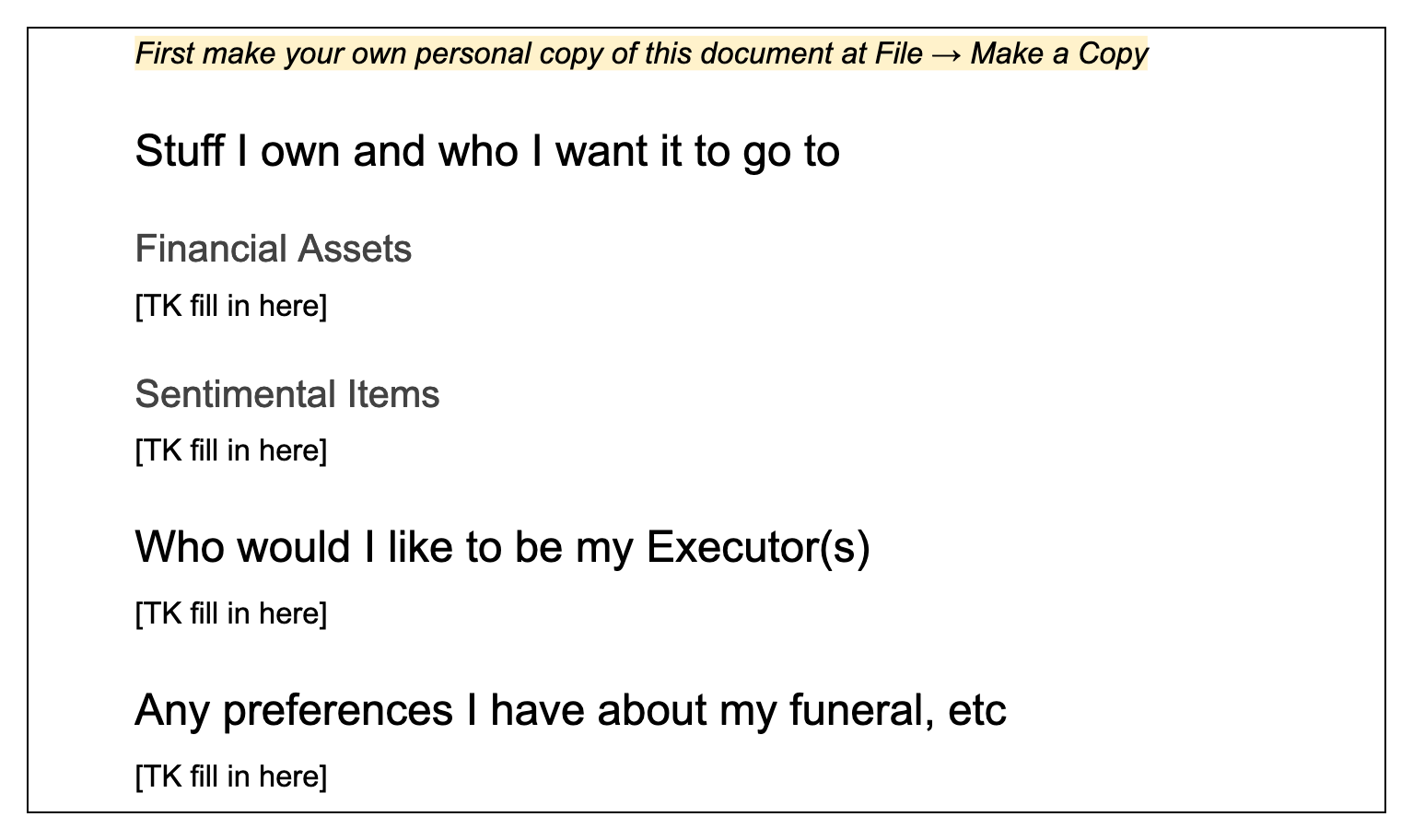80/20 Will Writing
I generally hate advice, and think most of it is bad and inapplicable.
Perhaps relatedly, I love trying to come up with advice-posts that I think are actually applicable and helpful for, if not most people in general, at least most people reading this blog right now.
One of those things is: if you haven't already, you should probably write a will. Right now.
One problem with a lot of advice is that if something is so unambiguously worth-doing, and not actually that hard to do, why would the reader not have done it already? In this case, I think I have a pretty simple explanation: most people are very avoidant of:
- tasks that are bureaucratic and legal
- the idea of death
- large amorphous tasks with no clear starting point
- tasks that involve hiring a professional
- tasks that seem far off, or low-probability, even if very important
Writing a will, people think, combines all of these avoidant properties and more. But I would argue that, for many of us, it's not actually crucial that a will be legally watertight – I strongly believe my next-of-kin would like to know my wishes and will follow them best as they can whether or not they're legally required to, so it's basically just kind to have something written that they can follow.
Here is a googledoc you can duplicate to start you off. The first tab is, I think, the literal briefest thing that could plausibly be called a [non legally binding!] will; in my view, you should just go to that tab and fill it in right now, without really thinking too much. It is MUCH easier to edit and improve a thing that already exists than to write something from scratch.

Again: if you just write some stuff in a googledoc, this is almost certainly not a legally valid will; the point here is just that, assuming your spouse/children/parents/other legal next-of-kin are basically predisposed to follow your wishes, just writing down your wishes is already a kind thing to do for them no matter the legal ramifications. So go do it!
I'm hesitant to even write the next steps after this, in case this allows you to procrastinate, because I truly think just "writing down roughly where you'd like your assets to go" has a significant share of the benefit of writing a will at all. But essentially, once you have something on digital paper, I think your next steps should be
1) fill out a more-fleshed-out version using a boilerplate template generated by your friendly neighbourhood LLM (see example here)
2) print that out, get two adults who are not beneficiaries to sign it, and keep physical copies in various places.
In this case, there's a greater chance that the thing you end up with could be a legal will, but this is extremely not legal advice. If it turns out your will is not legally binding, your assets will [most likely] instead go to your "default" next of kin, so if you have a lot of assets and/or a bad relationship with your immediate next-of-kin, you may well want to do something different.
But for many people in many cases I suspect a written, signed document expressing your desires would be go a long way towards determining where your assets go, whether or not that document would stand up under full legal scrutiny: basically, if the legal default recipients of your assets are inclined to follow your wishes then it's now very clear to everyone what your wishes were, whether or not the thing is watertight enough to ensure those wishes happen directly.
To end on a more uplifting note: once I overcame the various ick fields around the task of writing a will in general, I found it quite helpful and interesting just to ask myself: what would I want do with my money if I were no longer here? Which led to the obvious question: why am I not doing more of that with my money right now? Thinking about the impact I wanted to have with my life eventually helped me change what I did with my life today.
p.s. cannot stress enough how much this article is psychological but not legal advice. A non-legally-valid will will not be legally valid, and may cause your inheritors to pay more taxes even if they voluntarily decide to follow your wishes. But in my opinion it's always easier to have a polished v2 once you've made a rough v1, and writing something non-legally-binding down is better than thinking "I should really contact a lawyer I guess" and then procrastinating forever on that. So if you currently have no will, go here and make a version 0.